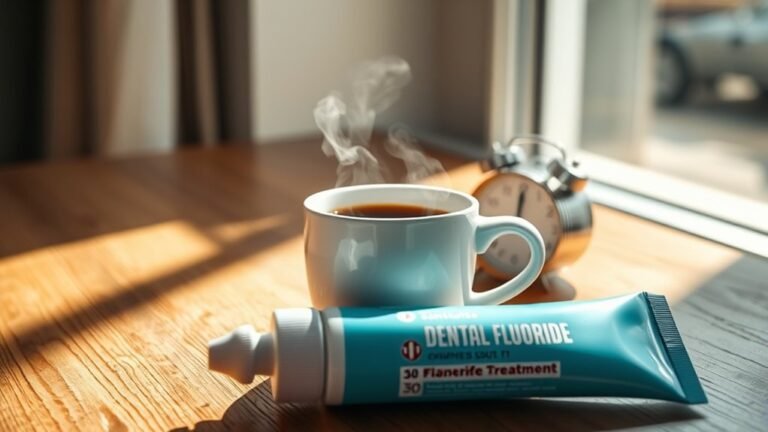Can I Drink Coffee After Wisdom Teeth Removal
You should avoid drinking coffee for at least 48 to 72 hours after wisdom teeth removal. Caffeine can lead to dehydration, increased pain, and complications like bleeding. It may also interfere with your recovery by disrupting sleep and complicating pain management. Instead, consider caffeine-free alternatives like herbal teas or broth-based soups to stay hydrated and nourished. For detailed tips on improving your recovery experience, continue to explore this topic.
Understanding the Healing Process After Surgery

After undergoing wisdom teeth removal, understanding the healing process is essential to guarantee a smooth recovery. Several healing factors contribute to your recovery timeline, including age, overall health, and adherence to post-operative care instructions. Typically, the initial healing phase lasts about three to five days, where swelling and discomfort peak. During this time, it’s vital to rest, stay hydrated, and avoid strenuous activities. You should monitor the extraction site for any signs of infection, such as increased pain or discharge. As the days progress, you may notice gradual improvement, with complete healing taking anywhere from a few weeks to a few months. Staying informed about these aspects empowers you to manage your recovery effectively and regain your freedom sooner.
Why Caffeine Might Not Be Ideal Post-Extraction
While you might be keen to return to your normal routine, consuming caffeine after wisdom teeth removal isn’t advisable for several reasons. First, caffeine can exacerbate dehydration, which is essential to avoid during recovery. Additionally, if you’re accustomed to caffeine, you may experience caffeine withdrawal symptoms, complicating your healing process.
| Impact of Caffeine | Considerations |
|---|---|
| Dehydration Risk | Prioritize hydration strategies post-extraction. |
| Increased Anxiety | Caffeine can heighten anxiety levels, hindering recovery. |
| Pain Management | Avoid substances that interfere with prescribed pain relief. |
| Sleep Disruption | Rest is critical; caffeine can disrupt sleep patterns. |
| Blood Pressure | Caffeine may elevate blood pressure, affecting recovery. |
Staying mindful of these factors can lead to a smoother healing journey.
Potential Risks of Drinking Coffee After Wisdom Teeth Removal

Drinking coffee after wisdom teeth removal can pose several risks that may impede your healing process. Caffeine can affect your body’s recovery, while the temperature of hot beverages may increase sensitivity at the extraction site. Additionally, caffeine’s diuretic properties could lead to dehydration, which is not ideal during your recovery.
Caffeine and Healing
Although many people enjoy a cup of coffee for its stimulating effects, consuming caffeine after wisdom teeth removal can pose potential risks to your healing process. Caffeine effects include increased heart rate and blood pressure, which may complicate your recovery. During the critical healing timeline, your body needs to focus on reducing inflammation and forming clots; caffeine can interfere by promoting vasoconstriction. This may slow down the healing process and increase discomfort. Additionally, if you’re taking pain medications, caffeine can exacerbate side effects, such as gastrointestinal upset. For ideal recovery, it’s advisable to limit or avoid coffee until your dentist confirms that you’re fully healed. Prioritizing your health during this time can help guarantee a smoother recovery journey.
Temperature Sensitivity
After wisdom teeth removal, your mouth may be particularly sensitive to temperature extremes, which can make drinking hot beverages like coffee risky. Consuming hot coffee can lead to significant temperature discomfort, exacerbating any swelling or irritation in the surgical area. This sensitivity can also extend to cold beverages, increasing the risk of cold sensitivity, which might trigger pain or discomfort when consuming chilled drinks. It’s important to listen to your body; if you experience heightened sensitivity, it’s wise to avoid extreme temperatures altogether. Instead, consider lukewarm options to minimize discomfort while allowing yourself a warm beverage. Taking these precautions can promote a smoother recovery and help maintain comfort during the healing process.
Dehydration Risk
While it may be tempting to reach for a cup of coffee during your recovery from wisdom teeth removal, it’s essential to contemplate the potential risk of dehydration. Caffeine, a diuretic, can exacerbate dehydration symptoms such as dizziness, dry mouth, and fatigue. Since your body needs ample hydration for ideal healing, consuming coffee may hinder your recovery. To mitigate these risks, prioritize hydration strategies like drinking water or electrolyte-rich beverages. Confirm you’re consuming enough fluids throughout the day to support your healing process. If you do choose to drink coffee, consider waiting until your recovery stabilizes and listen to your body’s signals. Staying well-hydrated is critical for a smooth and speedy recovery.
Recommended Timeline for Resuming Coffee Consumption

Once you’ve had your wisdom teeth removed, it’s important to follow a recommended timeline for resuming coffee consumption to guarantee proper healing. Generally, it’s best to wait at least 48 to 72 hours post-surgery before reintroducing coffee into your routine. This timing guideline helps reduce the risk of complications, such as increased bleeding or discomfort. In the meantime, consider coffee alternatives to ease cravings.
After wisdom teeth removal, wait 48 to 72 hours before enjoying coffee to ensure a smooth recovery.
- You’ll feel empowered by following your recovery plan.
- Enjoy the freedom of sipping your favorite brew once healed.
- Relish in the comforting aroma of fresh coffee again.
- Experience the joy of routine as you return to normal.
- Celebrate your healing milestones with your favorite drink!
Stay mindful of your body’s signals during recovery.
Alternatives to Coffee During Recovery
During your recovery from wisdom teeth removal, it’s important to find alternatives to coffee that won’t irritate your healing gums. Herbal teas, smoothies, and broth-based soups can provide hydration and nourishment while keeping your comfort a priority. These options help maintain energy levels without the potential complications associated with coffee consumption post-surgery.
Herbal Tea Options
If you’re seeking alternatives to coffee after wisdom teeth removal, herbal teas can be an excellent choice. These caffeine alternatives not only provide comfort but also come with various herbal benefits that promote healing. Consider these soothing options:
- Chamomile: Aids relaxation and reduces inflammation.
- Peppermint: Eases digestive discomfort and refreshes the palate.
- Ginger: Known for its anti-nausea properties and anti-inflammatory effects.
- Lemon Balm: Calms the mind and supports recovery.
- Rooibos: Rich in antioxidants, it helps strengthen the immune system.
Choosing herbal tea allows you to enjoy a warm beverage while aiding your recovery. Embracing these options guarantees you stay hydrated and nourished without compromising your healing process.
Smoothies for Nourishment
Herbal teas provide a soothing alternative for hydration post-surgery, but smoothies can offer a nutritious and satisfying option as well. They’re easy to consume and can be tailored to guarantee a proper nutrient balance. Here are some ideal smoothie ingredients to take into account during your recovery:
| Ingredient | Nutrient Benefit |
|---|---|
| Spinach | Rich in vitamins A and C |
| Banana | High in potassium |
| Greek yogurt | Excellent protein source |
| Berries | Packed with antioxidants |
Combining these ingredients can help you achieve a balanced diet while guaranteeing you stay nourished. Enjoying smoothies can not only aid your recovery but can also provide a revitalizing break from typical hydration options.
Broth-Based Soups
While coffee may be a comforting routine for many, it’s advisable to contemplate alternatives like broth-based soups after wisdom teeth removal. Broth not only provides hydration but also offers essential nutrients that can aid in your recovery. Here are some broth benefits and soup recipes you might consider:
- Soothing warmth that comforts during healing
- Nutrient-rich ingredients supporting tissue repair
- Easy to digest, minimizing strain on your mouth
- Versatile flavors to satisfy your palate
- Hydration that helps reduce inflammation
Choosing broth-based soups can enhance your recovery experience, helping you feel nourished without the discomfort that coffee might bring. With various recipes available, you can create a personalized approach to your healing process, ensuring you enjoy each sip.
Tips for a Smooth Recovery After Oral Surgery
Recovering from oral surgery can be challenging, but following specific guidelines can facilitate a smoother healing process. Prioritize post-surgery comfort by using ice packs on your cheeks to reduce swelling and taking prescribed medications as directed. Stick to a soft diet for the first few days, avoiding any hard or crunchy foods that could irritate your gums. Maintain excellent oral hygiene by gently rinsing your mouth with warm salt water after meals, being careful not to disturb the surgical sites. Avoid smoking and alcohol, as these can impede healing. Finally, stay hydrated and rest adequately to support your body’s recovery. By adhering to these tips, you’ll enhance your recovery experience and minimize complications.
Frequently Asked Questions
Can I Drink Decaffeinated Coffee After Wisdom Teeth Removal?
You can enjoy decaffeinated coffee after wisdom teeth removal, but it’s important to prioritize recovery hydration first. Decaffeinated coffee offers benefits like reduced acidity, making it gentler on your healing gums. Make sure it’s lukewarm to avoid discomfort. While it’s fine to indulge in decaf, balance it with plenty of water to support your recovery. Staying well-hydrated will aid in healing, so listen to your body and adjust your intake accordingly.
How Soon Can I Resume My Regular Diet After Surgery?
After surgery, you should gradually resume your regular diet based on your healing process. Initially, stick to soft food options like yogurt, mashed potatoes, and smoothies for the first few days. As you feel more comfortable and your swelling decreases, you can start incorporating firmer foods. Just listen to your body and avoid anything hard or crunchy until you’re fully healed, typically within a week or two post-surgery.
What Symptoms Indicate Complications After Drinking Coffee Post-Surgery?
After drinking coffee post-surgery, you should be aware of symptoms indicating complications. Watch for increased pain, swelling, or bleeding around the extraction site, which may signal issues. If you experience nausea or dizziness, it’s wise to consult your dentist. Effective pain management is vital during recovery, so stick to recommended medications and follow recovery tips. Prioritize hydration and nutrition to support healing, and don’t hesitate to reach out if you have concerns.
Can Iced Coffee Be Consumed During Recovery?
Iced coffee can be consumed during recovery, but it’s crucial to evaluate its effects. While it offers benefits like hydration and caffeine to boost your energy, you should monitor how your body responds. As a recovery beverage option, make sure it’s not too cold or acidic, which may irritate your healing tissues. Always prioritize gentle, soothing drinks, and consult your dentist if you experience any discomfort or complications. Stay mindful of your recovery.
Are There Specific Brands of Coffee Recommended for Recovery?
Imagine you’re savoring a cup of smooth, low-acidity coffee during your recovery process. Brands like Blue Bottle or Peet’s Coffee offer options that are gentle on your healing gums. These coffee brands focus on quality and flavor without overwhelming your palate. During recovery, it’s essential to choose beverages that won’t irritate your mouth, so stick to soft, mild coffees. Always consult your dentist to guarantee you’re making the best choice for your healing.






